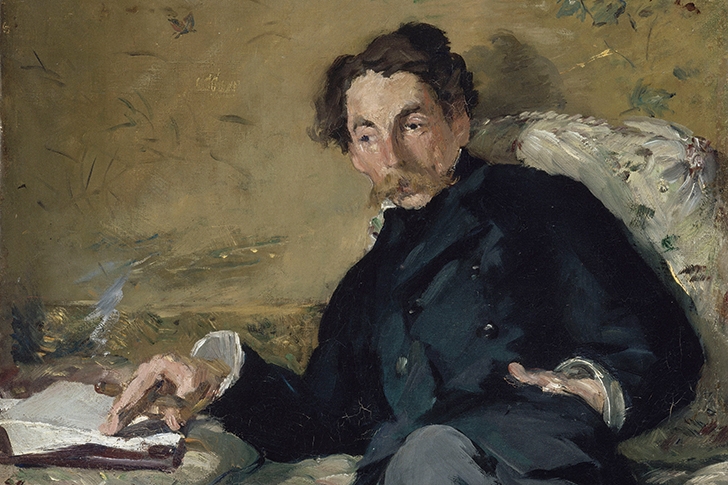Can American publishers be dissuaded from foisting absurd, bombastic subtitles on their books as if readers are all Trumpers avid for tawdry, over-simplified stunts? Howard Bloch is a professor at Yale whose previous books have had medieval French literature, the Bayeux tapestry and medieval misogyny as their subject matter. He has taken an entertaining diversion in his career by writing a relaxed and accessible book about Mallarmé’s poem of 1897, ‘Un coup de dés jamais n’abolira le hasard’ (‘One toss of the dice will never abolish chance’) and its place in belle époque Paris. The professor’s erudition and light touch need no Barnum-style booming.
There is nothing incredible in the story of Stéphane Mallarmé, who once edited a women’s fashion magazine but spent most of his working life as a schoolmaster teaching English. The French art of living with unostentatious comfort, gentle ease and healthy satisfaction was exemplified by the poet-schoolmaster. His domestic amenities included a menagerie of adored pets, among them greyhounds named Yseult and Saladin, an owl named Clair-de-lune, a bluebird, a waxbill, several little green parrots, a white cat called Snow, her daughter named Fog, and a black cat whose grandmother had been the subject of a poem by Baudelaire. Mallarmé’s smiling serenity, and his gestures which mixed a dancer’s grace with priestly benediction, make joyful reading.
Bloch provides an attractive summary of Mallarmé’s literary career, personal life and character. Mallarmé’s rare, endearing modesty and sweetness of nature stand in contradistinction to the ruthless egotism and infectious unhappiness of most Modernist innovators. He was an Anglophile, who befriended Frederick York Powell, the regius professor of history at Oxford, whose manner among the Christian clerics in his university was described by J.B. Yeats as ‘like a sailor fresh from many voyages who has come to see his cousin the church-sexton’. The French schoolmaster and the English historian had immediate, close affinity. Yeats called Powell an ‘infinite spirit prisoned in a finite mind — a winged and aspiring Celt captured and put into the cage of an Oxford donship.’ Mallarmé, too, was an infinite spirit, who like Powell loved rivers, fishing and sailing in small boats.
Mallarmé’s poetic masterwork is a seafarer’s account of a shipwreck. ‘Un coup de dés jamais n’abolira le hasard’ is brimful with watery images. Its evocation of foaming waves, howling wind and billowing sails, mists, thunderbolts, reefs and plumes, the luckless helmsman and the broken driftwood belong in a tradition begun by Homer’s Odyssey. Bloch compares it to Lewis Carroll’s ‘The Hunting of the Snark (An Agony in 8 Fits)’ (1876), but never mentions Gerard Manley Hopkins’s gloriously intense and thrillingly innovative ‘The Wreck of the Deutschland’ (1875–6), which is among the greatest of all 19th-century poems. Nor does he mention Hardy’s poem about the Titanic and its iceberg, ‘The Convergence of the Twain’ (1912), which ranks behind Hopkins but above Mallarmé in the list of poems of calamities at sea.
Mallarmé’s manuscript resembled sheet music. He laid out his poetic lines like a musical score, with ups and downs of intonation, and achieving a dissonance that anticipated the music of Stravinsky or Schoenberg. The typographical arrangement was unprecedented, with expanses of blank space between lines of different shape. The size of the printed words rose and fell like a tide. Sentences seemed as unaligned as a toppled mast or a tilting deck. The jumbled effect evoked debris. The precarious comprehensibility was like the chaos of a shipwreck.
Bloch is an enthusiastic and plausible communicator who thinks this one poem by Mallarmé is as important to modernism as Picasso’s ‘Demoiselles d’Avignon’, Stravinsky’s ‘Le Sacre du printemps’ and Eliot’s The Waste Land. He compares ‘Un coup de dés’ to Thomson’s discovery of the electron and to Einstein’s breakthroughs in physics. He suggests a convincing parallel — not overstretched — between Mallarmé’s final great poem and the development of moving cinema pictures by the Lumière brothers. Excessive background cultural detail occasionally distracts from Bloch’s central narrative: there is the sort of flighty, irrelevant allusiveness that one might get from a knowledgeable guide taking omnivorous, undiscriminating tourists on an hour’s trip through the Louvre.
There is an attractive undercurrent of hero-worship in Bloch’s references to Mallarmé, and some big claims that are almost sustained. ‘One Toss of the Dice’, Bloch maintains, contains ‘a great lesson in how to negotiate, after Nietzche’s declaration of the death of God, the treacheries of a rootless, secular world’. Mallarmé himself coined a phrase for the death-wish of the fin de siècle, ‘the ulterior immemorial demon … from the dead lands’.






Comments